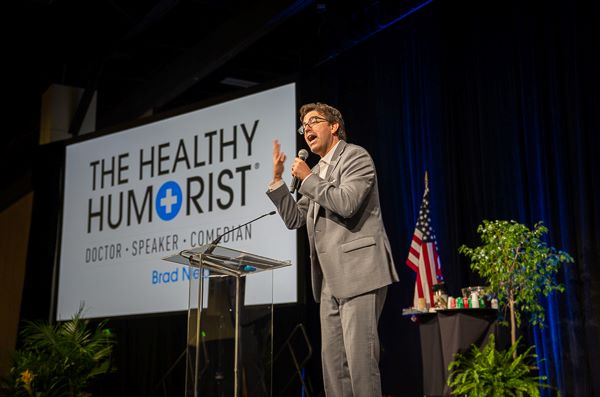
Physician-turned-keynote speaker Brad Nieder, MD, concluded TexMed 2023 on Saturday with an uplifting, humorous reminder that “laughter is the best medicine,” even for physicians.
Starting his presentation, he gifted every TexMed attendee with a prescription note ordering puns and humor to treat their ailments – even for those with a broken “funny bone.”
“That is my mantra. That is what I tell my patients, ” he said. “Unless you have a strange new viral infection.”
After getting his medical license, Dr. Nieder realized he could use his interest in both medicine and comedy to prescribe positivity to his patients and fellow physicians, many struggling with burnout.
“My real calling is to use laughter as preventative medicine,” he said.
To do this, the Healthy Humorist studied laughter throughout medical school and after, citing work by American anesthesiologist and internist Michael F. Roizen, MD, as especially inspiring.
Dr. Roizen documented in his book Real Age: Are You as Young as You Can Be? that although laughter helped his patients feel eight years younger and live eight years longer, modern adults only laugh roughly 10 times per day.
Dr. Nieder says this is a steep decline compared with preschool-aged children, who laugh up to 400 times a day. Asking the crowd, “What happened to us?” Dr. Nieder blamed external stressors like the COVID-19 pandemic and other medical field challenges for the decrease in laughter among fellow physicians.
“We were already burned and stressed out, and it got worse,” he said. “But we can keep our senses of humor intact. I believe wholeheartedly that laughter is the best medicine.”
To combat these stressors, Dr. Nieder prescribed laughter as a remedy, sharing the following benefits:
- Pain and stress management: When we laugh, we reduce levels of stress hormones in our blood.
- Immune system advantages: T-cell and immunoglobulin A activity in the blood have been shown to increase with laughter.
- Social engagement: Studies have found that socially isolated people get sick more often and die sooner than those with good social ties.
- Exercise benefits: We receive an aerobic workout every time we laugh.
- Mental health benefits: Pre-operative patients who listened to soothing music reported less anxiety than those who took anxiety medication, one study found.
Despite the medical field’s challenges, Dr. Nieder says living positively and seeking laughter is easier than it sounds.
First, the Healthy Humorist says medical professionals can facilitate laughter even by changing the way they speak, citing “over-complicated language” as a reason for over-seriousness in the workplace.
From medical school jargon to Latin-based coding systems in hospitals, he says, the medical field is riddled with “alphabet soup.”
To demonstrate this, he pulled Texas Medical Association leaders like President Rick Snyder, MD; TMA Women Physicians Section Executive Council Chair Emily Briggs, MD; and University of North Texas Health Science Center Texas College of Osteopathic Medicine student Kate Russell onto the stage to perform an educational dance about the use of heavy medical jargon in front of the crowd.
Proving his point, TexMed attendees roared with laughter as the TMA leaders danced to the tune of the “Hokey Pokey” and discussed the positives and negatives of health care.
“There’s still humor to be found despite stress,” Dr. Nieder said.
But “alphabet soup” is not the only issue Dr. Nieder warned against.
“Sometimes we are our own best source of laughter,” he said. “We should laugh at ourselves, laugh at our mistakes. Don’t forget your sense of humor.”
Sharing personal and family anecdotes, Dr. Nieder did just that and more as he laughed his way through the end of TexMed.
His final prescription for TexMed attendees, given in the rhythm of Dr. Seuss’ famous work, was to “Enjoy the view and be present.”
“To keep patients happy, keep a smile on their face,” he said.
Alisa Pierce
Reporter, Division of Communications and Marketing
(512) 370-1469